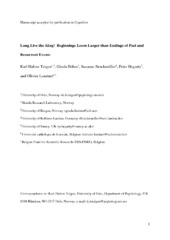Long live the king! Beginnings loom larger than endings of past and recurrent events
Peer reviewed, Journal article
Accepted version
Permanent lenke
https://hdl.handle.net/1956/17371Utgivelsesdato
2017-06Metadata
Vis full innførselSamlinger
- Faculty of Psychology [527]
Originalversjon
https://doi.org/10.1016/j.cognition.2017.02.013Sammendrag
Events are temporal “figures”, which can be defined as identifiable segments in time, bounded by beginnings and endings. But the functions and importance of these two boundaries differ. We argue that beginnings loom larger than endings by attracting more attention, being judged as more important and interesting, warranting more explanation, and having more causal power. This difference follows from a lay notion that additions (the introduction of something new) imply more change and demand more effort than do subtractions (returning to a previous state of affairs). This “beginning advantage” is demonstrated in eight studies of people’s representations of epochs and events on a historical timeline as well as in cyclical change in the annual seasons. People think it is more important to know when wars and reigns started than when they ended, and are more interested in reading about beginnings than endings of historical movements. Transitional events (such as elections and passages from one season to the next) claim more interest and grow in importance when framed as beginnings of what follows than as conclusions of what came before. As beginnings are often identified in retrospect, the beginning advantage may distort and exaggerate their actual historical importance.

